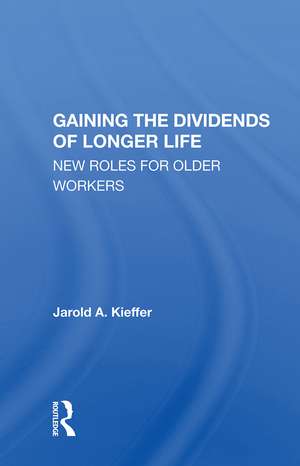Gaining The Dividends Of Longer Life: New Roles For Older Workers
Autor Jarold A. Kiefferen Limba Engleză Hardback – 7 iun 2019
Preț: 765.19 lei
Preț vechi: 1027.99 lei
-26% Nou
Puncte Express: 1148
Preț estimativ în valută:
146.48€ • 150.99$ • 123.51£
146.48€ • 150.99$ • 123.51£
Carte tipărită la comandă
Livrare economică 27 februarie-13 martie
Preluare comenzi: 021 569.72.76
Specificații
ISBN-13: 9780367018467
ISBN-10: 0367018462
Pagini: 188
Dimensiuni: 147 x 229 mm
Greutate: 0.51 kg
Ediția:1
Editura: Taylor & Francis
Colecția Routledge
Locul publicării:Oxford, United Kingdom
ISBN-10: 0367018462
Pagini: 188
Dimensiuni: 147 x 229 mm
Greutate: 0.51 kg
Ediția:1
Editura: Taylor & Francis
Colecția Routledge
Locul publicării:Oxford, United Kingdom
Cuprins
Also of Interest -- Preface -- Introduction -- The Retirement Strategy: Its Origins and Consequences -- The Origins of the Retirement Strategy -- Why and How the Retirement Strategy Worked -- Failed Objectives and Wasted People -- Counterproductive Strategy -- Factors Working Against the Retirement Strategy -- Growing Dilemmas in Financing Retirement Systems -- The Need for a Jobs Strategy -- The Retirement Strategy Must Be Ended -- The Urgency of Adopting a Jobs Strategy -- How to Create and Maintain the Needed Jobs -- Leadership for Jobs and Retirement Income Strategies -- The Need for Positive, Long-Term Thinking and Action -- Financing a Jobs Expansion Strategy -- More Private Saving for Retirement -- The Personal Challenge -- What Older People Can Expect -- What Older People Can Do -- The Merging Interests of Young and Old -- Addendum on Social Security Act Amendments of 1983
Descriere
Not all older people are unfit for work. Indeed, most people over age 55 remain physically and mentally able to work, and rather than suffer the pressures of inflation or the boredom of idleness, many would prefer to stay productive longer. Dr. Kieffer says that their extensive experience and education qualify most of them to remain self-reliant well past current retirement ages. If they are enabled to do so, it would delay and reduce the time when they are forced to be financially and, in some cases, physically dependent. He argues that unless policy leaders in both the public and private sectors act quickly and imaginatively to gain the financial and social dividends that can accrue from longer life, our country, by default, will find itself preoccupied over the next thirty years with unnecessarily high costs of supporting its longer-living and rapidly increasing older population. Dr. Kieffer explains why current retirement policies are no longer economically and politically manageable, and he suggests a cost-effective strategy whereby public and private funds could be used to enable millions of older people to remain active in jobs that serve unmet community needs. He also outlines a strategy for helping young workers build retirement income assets during their entire work lives so that the unintended burdens that have fallen on the Social Security, pension, and public assistance programs can be eased and made more manageable in the future. Lastly, he describes the roles that government agencies, businesses, educational institutions, foundations, and older people themselves can play in carrying out the jobs and retirement income strategies.
